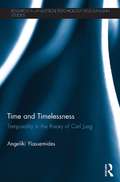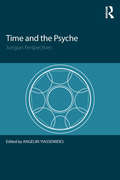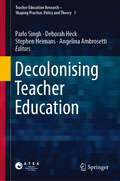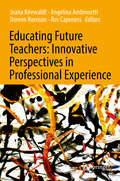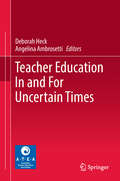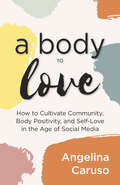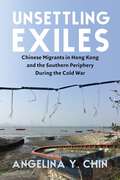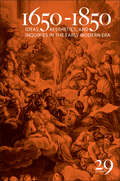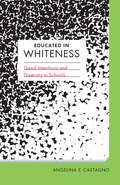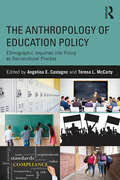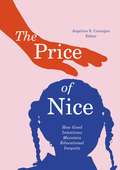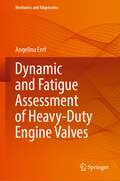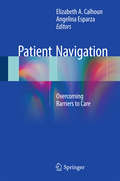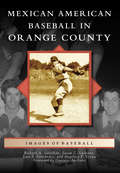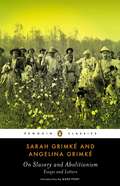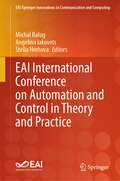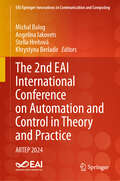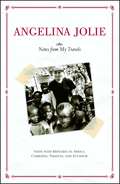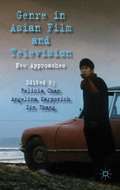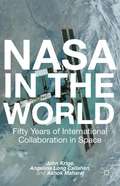- Table View
- List View
Time and Timelessness: Temporality in the theory of Carl Jung (Research in Analytical Psychology and Jungian Studies)
by Angeliki YiassemidesTime and Timelessness examines the development of Jung's understanding of time throughout his opus, and the ways in which this concept has affected key elements of his work. In this book Yiassemides suggests that temporality plays an important role in many of Jung's central ideas, and is closely interlinked with his overall approach to the psyche and the cosmos at large. Jung proposed a profound truth: that time is relative at large. To appreciate the whole of our experience we must reach beyond causality and temporal linearity, to develop an approach that allows for multidimensional and synchronistic experiences. Jung’s understanding surpassed Freud's dichotomous approach which restricted timelessness to the unconscious; his time theory allows us to reach beyond the everyday time-bound world into a greater realm, rich with meaning and connection. Included in the book: -Jung’s time theory -the death of time -time and spatial metaphors -the role of time in precognition, telepathy and synchronicity -Unus mundus and time -a comparison of Freud’s and Jung’s time theories: temporal directionality, dimensionality, and the role of timelessness. This book is the first to explore time and timelessness in a systematic manner from a Jungian perspective, and the first to investigate how the concept of time affected the overall development of Jung's theory. It will be key reading for psychoanalytic scholars and clinicians, as well as those working in the field of phenomenological philosophy.
Time and the Psyche: Jungian Perspectives
by Angeliki YiassemidesIn Time and the Psyche, a diverse selection of contributors explores the multi-layered aspects of time through the lens of analytical psychology. The book aims to bridge the gap between theory and practice, emphasising time's fundamental role in the workings and expressions of the psyche, and additionally exploring cultural and clinical dimensions. The contributors deal with temporality in our inner world and its manifestations as expressed by products of our psyche, covering topics including disturbances of temporality within the psychoanalytic session, the acausal connecting principle of synchronicity, time as expressed in film, objects, literature, and culture, and temporality as understood in various types of dreams and imaginary practices. The book also explores the time-bound world, time versus timelessness, the realm of the eternal, human versus cosmic time, Chronos versus Kairos and other temporality-related dimensions and their relationship to our psyche and our experience in the world. With contributors from backgrounds in clinical work, the arts, literature, and philosophy, this collection is unique in its scope. Time and the Psyche is a thought-provoking reading for academics and students of Jungian and post-Jungian studies, analytical psychologists and Jungian analysts in practice and in training.
Styled: Secrets for Arranging Rooms, from Tabletops to Bookshelves
by Emily Henderson Angelin BorsicsThe ultimate guide to thinking like a stylist, with 1,000 design ideas for creating the most beautiful, personal, and livable roomsIt's easy to find your own style confidence once you know this secret: While decorating can take months and tons of money, styling often takes just minutes. Even a few little tweaks can transform the way your room feels. At the heart of Styled are Emily Henderson's ten easy steps to styling any space. From editing out what you don't love to repurposing what you can't live without to arranging the most eye-catching vignettes on any surface, you'll learn how to make your own style magic. With Emily's insider tips and more than 1,000 unique ideas from 75 envy-inducing rooms, you'll soon be styling like you were born to do it.
Decolonising Teacher Education (Teacher Education Research – Shaping Practice, Policy and Theory #1)
by Angelina Ambrosetti Deborah Heck Parlo Singh Stephen HeimansThis book makes a deliberate attempt to explore the complexity of decolonising theories in teacher education. It draws attention to the historical and emerging impacts of colonialism on educational institutions and practices, challenging educators to expand their understanding of diverse trajectories of decolonial research both theoretically and practically. It adds to the discussions and dialogues between different disciplinary traditions, such as postcolonial and decolonial studies, as well as critical Indigenous and critical race studies. As an international compilation, it offers educators a unique opportunity to envision teacher education through alternative lenses—rethinking the relationship between ontology-epistemology-ethics, that is, what constitutes knowledge, how it is produced, and what material worlds are constructed in and through knowledge / research systems. Through compelling examples, this book illustrates how educators have navigated epistemic injustices within the field of teacher education amidst the rising global demands for standardisation. It encourages teacher educators to explore alternative theories within their own contexts, crafting new teacher education practices in universities and schools.
Educating Future Teachers: Innovative Perspectives in Professional Experience
by Jeana Kriewaldt Angelina Ambrosetti Doreen Rorrison Ros CapenessThis book describes, problematises and theorises professional practice research in a range of Australian settings to provide evidence of robust, wide-ranging and contemporary approaches to professional experience in initial teacher education. It presents the latest research and evidence from those currently involved in innovative programmes designed to provide alternatives to meet local challenges during professional experience in teacher education. As the professional experience process is framed quite differently across Australian teacher education programmes, these cross-institutional accounts of collaboration, innovation and success make a major contribution to the field, both nationally and internationally. The book was developed from a research workshop funded by an Australian Association for Research in Education grant and organised by the Teacher Education Research and Innovation Special Interest Group.
Teacher Education In and For Uncertain Times
by Angelina Ambrosetti Deborah HeckThis volume considers the role of initial and continuing teacher education in uncertain times. It highlights key principles and methods that preserve curiosity and optimism regarding the potential of teacher education, and regarding the manifold achievements of pre-service and in-service teachers. It explores how teacher education can produce teachers who are committed to counter-oppressive curricula and pedagogies, and reflects the critical role of teacher educators as public academics.
A Critical History and Philosophy of Psychology
by Richard T. G. Walsh Thomas Teo Angelina Baydala Richard T. G. Walsh Thomas TeoIn line with the British Psychological Society's recent recommendations for teaching the history of psychology, this comprehensive undergraduate textbook emphasizes the philosophical, cultural and social elements that influenced psychology's development. The authors demonstrate that psychology is both a human (i. e. psychoanalytic or phenomenological) and natural (i. e. cognitive) science, exploring broad social-historical and philosophical themes such as the role of diverse cultures and women in psychology, and the complex relationship between objectivity and subjectivity in the development of psychological knowledge. The result is a fresh and balanced perspective on what has traditionally been viewed as the collected achievements of a few 'great men'. With a variety of learning features, including case studies, study questions, thought experiments and a glossary, this new textbook encourages students to critically engage with chapter material and analyze themes and topics within a social, historical and philosophical framework.
A Body to Love: How to Cultivate Community, Body Positivity, and Self-Love in the Age of Social Media
by Angelina CarusoHow to Have A Healthy Relationship with Food and Body Image in the Digital Age“Anyone who has ever had a ‘complicated’ relationship with food or their body will benefit from this book.” ?Brenna O’Malley, registered dietitian and founder of The Wellful#1 New Release in Human-Computer Interaction, Eating Disorder Self-Help, and Computer ScienceA new conversation about the media and radical self-love, A Body to Love provides lessons on positively navigating body image in a social media saturated world.Forming healthy relationships with the internet. To Angelina Caruso, recovery meant finding her tribe?a community that offered support, encouragement, and zero judgement. But she never imagined finding them online. Now a health and wellness blogger, she narrates the progression of a body image disorder and her unusual path to recovery.Self-help healing through community. Grouped into lessons and warnings, this fresh take on social networks follows the author’s personal battle with a near-fatal eating disorder, the online relationships that helped her heal, and the eventual community she cultivated. Part social media guide and part body image and eating disorder workbook, you’ll learn to detect body image issues, heal as a mindful consumer, and inspire others as a content producer.Inside this interactive book, adult and teen readers alike will find:Handy chartsJournal promptsBreathing exercisesBonus recipes for mindful eatingAnd much more!If you’re looking for a body positivity journal, body image gifts, or mindful eating books?like The Self-Love Workbook for Women, The Body Is Not an Apology, More Than a Body, or Influencer?then you’ll want to own A Body to Love.
Unsettling Exiles: Chinese Migrants in Hong Kong and the Southern Periphery During the Cold War
by Angelina ChinThe conventional story of Hong Kong celebrates the people who fled the mainland in the wake of the establishment of the People’s Republic of China in 1949. In this telling, migrants thrived under British colonial rule, transforming Hong Kong into a cosmopolitan city and an industrial and financial hub. Unsettling Exiles recasts identity formation in Hong Kong, demonstrating that the complexities of crossing borders shaped the city’s uneasy place in the Sinophone world.Angelina Y. Chin foregrounds the experiences of the many people who passed through Hong Kong without settling down or finding a sense of belonging, including refugees, deportees, “undesirable” residents, and members of sea communities. She emphasizes that flows of people did not stop at Hong Kong’s borders but also bled into neighboring territories such as Taiwan and Macau. Chin develops the concept of the “Southern Periphery”—the region along the southern frontier of the PRC, outside its administrative control yet closely tied to its political space. Both the PRC and governments in the Southern Periphery implemented strict migration and deportation policies in pursuit of border control, with profound consequences for people in transit. Chin argues that Hong Kong identity emerged from the collective trauma of exile and dislocation, as well as a sense of being on the margins of both the Communist and Nationalist Chinese regimes during the Cold War. Drawing on wide-ranging research, Unsettling Exiles sheds new light on Hong Kong’s ambivalent relationship to the mainland, its role in the global Cold War, and the origins of today’s political currents.
Atlas of PET/CT in Pediatric Patients
by Angelina CistaroThis richly illustrated book presents the pediatric applications of PET/CT in the full range of scenarios frequently encountered in a professional setting. It opens with a thorough introduction covering the fundamental science and the clinical basis for use of PET/CT in this age group. Pitfalls and artifacts are examined, and normal variations and benign findings are carefully described. Each subsequent chapter addresses the role of PET/CT with different radiopharmaceuticals in the evaluation and management of a specific disease. The full range of oncological diseases is covered, including the rare ones. Succinct descriptions of clinical cases are included and, when appropriate, comparisons are made with other modalities. In addition, the role of PET/CT in biopsy guidance and in radiation therapy planning is explained. This book will be invaluable for residents and practitioners in nuclear medicine, radiology, oncology, radiation oncology, and nuclear medicine technology
1650-1850: Ideas, Aesthetics, and Inquiries in the Early Modern Era (Volume 29) (1650-1850 #29)
by Deborah Kennedy Greg Clingham Paul Tankard Christopher Johnson Susan Spencer Elizabeth Kraft Anthony W. Lee Ileana Baird Christina Ionescu Christopher Trigg Gefen Bar-On Santor John Knapp Paul DeGategno Jeanne M. Britton Angelina Dulong Mona Scheuermann Leigh D. Dillard Catherine J. Theobald Timothy Erwin Laurence Roussillon-Constanty Yanzhang Cui Duane Coltharp Thomas Hothem John C. Traver Courtney A. HoffmanExploratory, investigative, and energetically analytical, 1650–1850 covers the full expanse of long eighteenth-century thought, writing, and art while delivering abundant revelatory detail. Essays on well-known cultural figures combine with studies of emerging topics to unveil a vivid rendering of a dynamic period, simultaneously committed to singular genius and universal improvement. Welcoming research on all nations and language traditions, 1650–1850 invites readers into a truly global Enlightenment. Topics in volume 29 include Samuel Johnson’s notions about the education of women and a refreshing account of Sir Joseph Banks’s globetrotting. A guest-edited, illustration-rich, interdisciplinary special feature explores the cultural implications of water. As always, 1650–1850 culminates in a bevy of full-length book reviews critiquing the latest scholarship on long-established specialties, unusual subjects, and broad reevaluations of the period. ISSN 1065-3112 Published by Bucknell University Press, distributed worldwide by Rutgers University Press.
Educated in Whiteness: Good Intentions and Diversity in Schools
by Angelina E. CastagnoEducators across the nation are engaged in well-meaning efforts to address diversity in schools given the current context of NCLB, Race to the Top, and the associated pressures of standardization and accountability. Through rich ethnographic accounts of teachers in two demographically different secondary schools in the same urban district, Angelina E. Castagno investigates how whiteness operates in ways that thwart (and sometimes co-opt) even the best intentions and common sense—thus resulting in educational policies and practices that reinforce the status quo and protect whiteness rather than working toward greater equity.Whereas most discussions of the education of diverse students focus on the students and families themselves, Educated in Whiteness highlights the structural and ideological mechanisms of whiteness. In schools, whiteness remains dominant by strengthening and justifying the status quo while simultaneously preserving a veneer of neutrality, equality, and compassion. Framed by critical race theory and whiteness studies, this book employs concepts like interest convergence, a critique of liberalism, and the possessive investment in whiteness to better understand diversity-related educational policy and practice.Although in theory most diversity-related educational policies and practices are intended to bring about greater equity, too often in practice they actually maintain, legitimate, and so perpetuate whiteness. Castagno not only sheds light on this disconnect between the promises and practices of diversity-related initiatives but also provides insight into why the disconnect persists.
The Anthropology of Education Policy: Ethnographic Inquiries into Policy as Sociocultural Process
by Angelina E. Castagno Teresa MccartyAdvancing a rapidly growing field of social science inquiry—the anthropology of policy—this volume extends and solidifies this body of work, focusing on education policy. Its goal is to examine timely issues in education policy from a critical anthropological, ethnographic, and comparative perspective, and through this to theorize new ways of understanding how policy "does its work." At the center is a commitment to an engaged anthropology of education policy that uses anthropological knowledge to imagine and foster more equitable and just forms of schooling. The authors examine the ways in which education policy processes create, reflect, and contest regimes of knowledge and power, sorting and stratifying people, ideas, and resources in particular ways. In contrast to conventional analyses of policy as text-based, dictated, linear, and rational, an anthropological perspective positions policy at the interface of top-down, bottom-up, and meso-level processes, and as de facto and de jure. Demonstrating how education policy operates as a social, cultural, and deeply ideological process "on the ground," each chapter clearly delineates the implications of these understandings for educational access, opportunity, and equity. Providing a single "go to" source on the disciplinary history, theoretical framework, methodology, and empirical applications of the anthropology of education policy across a range of education topics, policy debates, and settings, the book updates and expands on seminal works in the field, carving out an important niche in anthropological studies of public policy.
The Price of Nice: How Good Intentions Maintain Educational Inequity
by Angelina E. CastagnoHow being &“nice&” in school and university settings works to reinforce racialized, gendered, and (dis)ability-related inequities in education and society Being nice is difficult to critique. Niceness is almost always portrayed and felt as a positive quality. In schools, nice teachers are popular among students, parents, and administrators. And yet Niceness, as a distinct set of practices and discourses, is not actually good for individuals, institutions, or communities because of the way it maintains and reinforces educational inequity. In The Price of Nice, an interdisciplinary group of scholars explores Niceness in educational spaces from elementary schools through higher education to highlight how this seemingly benign quality reinforces structural inequalities. Grounded in data, personal narrative, and theory, the chapters show that Niceness, as a raced, gendered, and classed set of behaviors, functions both as a shield to save educators from having to do the hard work of dismantling inequity and as a disciplining agent for those who attempt or even consider disrupting structures and ideologies of dominance. Contributors: Sarah Abuwandi, Arizona State U; Colin Ben, U of Utah; Nicholas Bustamante, Arizona State U; Aidan/Amanda J. Charles, Northern Arizona U; Jeremiah Chin, Arizona State U; Sally Campbell Galman, U of Massachusetts; Frederick Gooding Jr., Texas Christian U; Deirdre Judge, Tufts U; Katie A. Lazdowski; Román Liera, U of Southern California; Sylvia Mac, U of La Verne; Lindsey Malcolm-Piqueux, California Institute of Technology; Giselle Martinez Negrette, U of Wisconsin–Madison; Amber Poleviyuma, Arizona State U; Alexus Richmond, Arizona State U; Frances J. Riemer, Northern Arizona U; Jessica Sierk, St. Lawrence U; Bailey B. Smolarek, U of Wisconsin–Madison; Jessica Solyom, Arizona State U; Megan Tom, Arizona State U; Sabina Vaught, U of Oklahoma; Cynthia Diana Villarreal, U of Southern California; Kristine T. Weatherston, Temple U; Joseph C. Wegwert, Northern Arizona U; Marguerite Anne Fillion Wilson, Binghamton U; Jia-Hui Stefanie Wong, Trinity College; Denise Gray Yull, Binghamton U.
Dynamic and Fatigue Assessment of Heavy-Duty Engine Valves (Mechanics and Adaptronics)
by Angelina EretThis book provides findings on the simulation of the valve dynamic to the current technological standards. Above all, it delivers a simulation based and predictive approach on the fatigue strength assessment of four-stroke heavy-duty engine valves. The demand for more efficient combustion engines with fuel flexibility goes along with increasing component requirements regarding strength and durability, while the development costs should remain low. In this context, the present book focuses on the gas exchange valves of heavy-duty engines. Especially, the valves on the exhaust side have an increased risk of fatigue failure. The aim of this book is the generation of a predictive fatigue strength assessment to strengthen the frontloading of the exhaust valve design process and to increase the reliability of the component. In the context of fatigue assessment, this book examines the loads of the exhaust valve during its working cycle. Beside the high temperature and cylinder pressure, further loads act on the exhaust valve like actuation force or an eccentric impact of the valve on the valve seat ring. Furthermore, a bold valve secondary dynamic in the form of valve bending vibrations is observed on the exhaust valves of heavy-duty engines increasing the valve load even more. The cause of this secondary dynamic is unknown. This book investigates the valve loads to get the necessary input for the fatigue strength assessment. With respect to a predictive approach, the determination of valve dynamic and valve loads is based on a multibody simulation model of the valve train. In order to deliver predictive results and a transferable method, this simulation model includes all relevant physical effects to describe the valve dynamic accurately during all valve load phases of the working cycle. With the simulation model, the root cause for the bold valve secondary dynamic is examined iteratively. The model delivers not only the cause for the valve secondary dynamic but most importantly the critical valve loads. These loads deliver the input for the fatigue strength assessment. To ensure the robustness of the load data determined by the simulation model, the sensitivity of influences on the valve load is examined. In this context geometrical misalignment, fluctuations in load data and variable engine operation points are considered. A load collective based on the variation of influences on the valve load is the result of this analysis. All the results of the influence and sensitivity study are generated with the newly developed simulation model of the valve train. Moreover, this book outlines measurements on a testbed engine. In scope of these measurements are temperature and strain measurements of the valve. The generated data validate the simulation model of the valve train. Additionally, the statistical evaluation of the data is used in the subsequent fatigue strength assessment to increase the reliability of the results.
Patient Navigation
by Elizabeth A. Calhoun Angelina EsparzaDocumenting the success and result of patient navigation programs, this book represents the culmination of years of research and practical experience by scientific leaders in the field. A practical guide to creating, implementing, and evaluating successful programs, Patient Naviation - Overcoming Barriers to Care offers a step-by-step guide towards creating and implementing a patient navigation program within a healthcare system. Providing a formal structure for evaluation and quality improvement this book is an essential resource for facilities seeking patient navigation services accreditation.
Mexican American Baseball in Orange County (Images of Baseball)
by Gustavo Arellano Richard A. Santillan Angelina F. Veyna Luis F. Fernandez Susan C. LuévanoImages of Baseball: Mexican American Baseball in Orange County celebrates the once-vibrant culture of baseball and softball teams from Placentia, Anaheim, Santa Ana, Westminster, San Juan Capistrano, and nearby towns. Baseball allowed men and women to showcase their athletic and leadership skills, engaged family members, and enabled community members to develop social and political networks. Players from the barrios and colonias of La Fábrica, Campo Colorado, La Jolla, Logan, Cypress Street, El Modena, and La Colonia Independencia, among others, affirmed their Mexican and American identities through their sport. Such legendary teams as the Placentia Merchants, the Juveniles of La Habra, the Lionettes de Orange, the Toreros of Westminster, and the Road Kings of Colonia 17th made weekends memorable. Players and their families helped create the economic backbone and wealth evident in Orange County today. This book sheds light on powerful images and stories of the Mexican American community.
On Slavery and Abolitionism
by Mark Perry Angelina Grimke Sarah GrimkeA collection of historic writings from the slave-owner-turned-abolitionist sisters portrayed in Sue Monk Kidd's novel The Invention of WingsSarah and Angelina Grimké's portrayal in Sue Monk Kidd's latest novel, The Invention of Wings, has brought much-deserved new attention to these inspiring Americans. The first female agents for the American Anti-Slavery Society, the sisters originally rose to prominence after Angelina wrote a rousing letter of support to renowned abolitionist William Garrison in the wake of Philadelphia's pro-slavery riots in 1935. Born into Southern aristocracy, the Grimkés grew up in a slave-holding family. Hetty, a young house servant, whom Sarah secretly taught to read, deeply influenced Sarah Grimké's life, sparking her commitment to anti-slavery activism. As adults, the sisters embraced Quakerism and dedicated their lives to the abolitionist and women's rights movements. Their appeals and epistles were some of the most eloquent and emotional arguments against slavery made by any abolitionists. Their words, greeted with trepidation and threats in their own time, speak to us now as enduring examples of triumph and hope.For more than sixty-five years, Penguin has been the leading publisher of classic literature in the English-speaking world. With more than 1,500 titles, Penguin Classics represents a global bookshelf of the best works throughout history and across genres and disciplines. Readers trust the series to provide authoritative texts enhanced by introductions and notes by distinguished scholars and contemporary authors, as well as up-to-date translations by award-winning translators.From the Trade Paperback edition.
Der Anti-Stress-Trainer für Erzieher: Mit Kreativität und eigener Anleitung zum entspannteren Umgang mit Stress! (Anti-Stress-Trainer)
by Ingo Caspar Angelina HeimDieses Buch aus der Anti-Stress-Trainer-Reihe beschäftigt sich mit den typischen Stressfaktoren bei Erzieherinnen und Erziehern und wie souverän mit diesen umgegangen werden kann. Der Arbeitsalltag von Erziehern hat sich in den letzten Jahren stark gewandelt und ist noch komplexer geworden. Fehlende Anerkennung, eine geringe Bezahlung, ein hoher Lärmpegel im Arbeitsalltag, aber auch die gestiegenen Erwartungen einiger Eltern sind nur einige der großen Herausforderungen dieses Berufes. Dieses Buch hilft Erziehern dabei, ihre persönlichen Stresssituationen im Berufsalltag zu erkennen und erfolgreich zu meistern. Die Autoren geben dafür ihre wertvollen eigenen Erfahrungen aus dem Erzieher-Arbeitsalltag und der Beratung für den sozialen Sektor im Bereich professioneller Umgang mit Stress weiter. Dabei geben sie viele nützliche Praxistipps, die leicht in den Alltag integriert werden können und Sie so den schönen Beruf des Erziehers trotz Stress wieder genießen lassen.
EAI International Conference on Automation and Control in Theory and Practice (EAI/Springer Innovations in Communication and Computing)
by Michal Balog Angelina Iakovets Stella HrehovaThis book presents the proceedings of the 15th EAI International Conference on Automation and Control in Theory and Practice (ARTEP 2023), held in Stará Lesná, Slovakia, February 8-10, 2023. The aim of the conference was to meet the experts in the field of control, industrial automation and ICT in the industry from universities, colleges, and practice. The conference aims to draw attention to modern trends in the field, to enable experts, pedagogues and scientific researchers to present the results achieved in their work, to exchange experiences and establish working contacts between meeting participants. The ARTEP proceedings includes papers on automation and control and their integration of technologies such as Industry 4.0, robotics, and IoT. ARTEP is primarily a conference for scientists and practitioners who develop and study automation, management, and technologies.
The 2nd EAI International Conference on Automation and Control in Theory and Practice: ARTEP 2024 (EAI/Springer Innovations in Communication and Computing)
by Michal Balog Angelina Iakovets Stella Hrehová Khrystyna BerladirThis book presents the proceedings of the EAI International Conference on Automation and Control in Theory and Practice (ARTEP 2024), held in Orechová Potôň, Slovakia, February 7-9, 2024. The aim of the conference was to meet the experts in the field of control, industrial automation and ICT in the industry from universities, colleges, and practice. The conference aims to draw attention to modern trends in the field, to enable experts, pedagogues and scientific researchers to present the results achieved in their work, to exchange experiences and establish working contacts between meeting participants. The ARTEP proceedings includes papers on automation and control and their integration of technologies such as Industry 4.0, robotics, and IoT. ARTEP is primarily a conference for scientists and practitioners who develop and study automation, management, and technologies.
A Practical Guide to Therapeutic Work with Asylum Seekers and Refugees
by Paul Cilia La Corte Angelina Jalonen Jerry CloreThe need to support refugees has never been more urgent, but how can everyone working with them provide consistently effective care? Written for a range of professionals including therapists, teachers, social workers, housing support workers and healthcare professionals, this essential guide offers a holistic, person-centred framework to ensure that all those working with refugees to provide them with excellent support. Informed by the authors' direct work with refugees, the book starts with a comprehensive introduction to understanding the underlying issues that lead to the complex needs of an asylum seeking client group. Using an easy-to-follow 'what?', 'why?' and 'how?' structure, within the four key phases of refugee experience. It also shows professionals how to sensitively address trauma, loss and separation with clients who are adjusting to a foreign culture and language using three core principles (therapeutic relationship, bearing witness and psycho-education). Informed and accessible, this guide will help you create a safe, welcoming environment for asylum seekers in all stages of their journey to improve their psychosocial wellbeing and mental health.
Notes from My Travels
by Angelina JolieThree years ago, award-winning actress Angelina Jolie took on a radically different role as a Goodwill Ambassador for the UN High Commissioner for Refugees (UNHCR). Here are her memoirs from her journeys to Sierra Leone, Tanzania, Pakistan, Cambodia, and Ecuador, where she lived and worked and gave her heart to those who suffer the world's most shattering violence and victimization. Here are her revelations of joy and warmth amid utter destitution...compelling snapshots of courageous and inspiring people for whom survival is their daily workŠand candid notes from a unique pilgrimage that completely changed the actress's worldview -- and the world within herself.
Genre in Asian Film and Television
by Felicia Chan Angelina KarpovichGenre in Asian Film and Television takes a dynamic approach to the study of Asian screen media previously under-represented in academic writing. It combines historical overviews of developments within national contexts with detailed case studies on the use of generic conventions and genre hybridity in contemporary films and television programmes.
NASA IN THE World
by John Krige Angelina Long Callahan Ashok MaharajSince its inception, NASA has participated in over 4,000 international projects, yet historians have almost entirely neglected this remarkable aspect of the agency's work. This groundbreaking work is the first to trace NASA's history in a truly international context, drawing on unprecedented access to agency archives and personnel.
